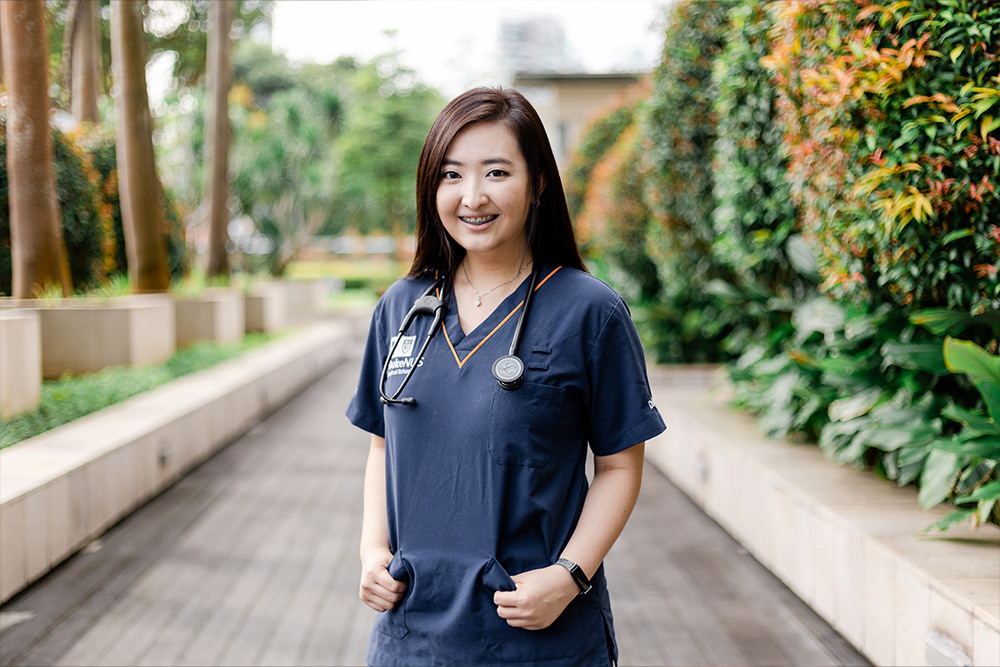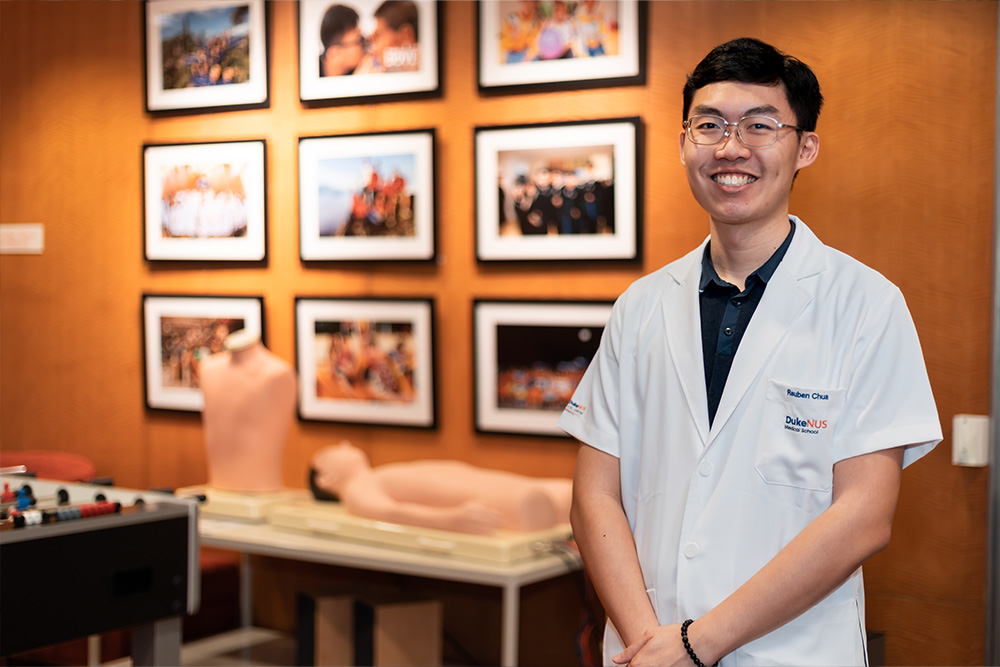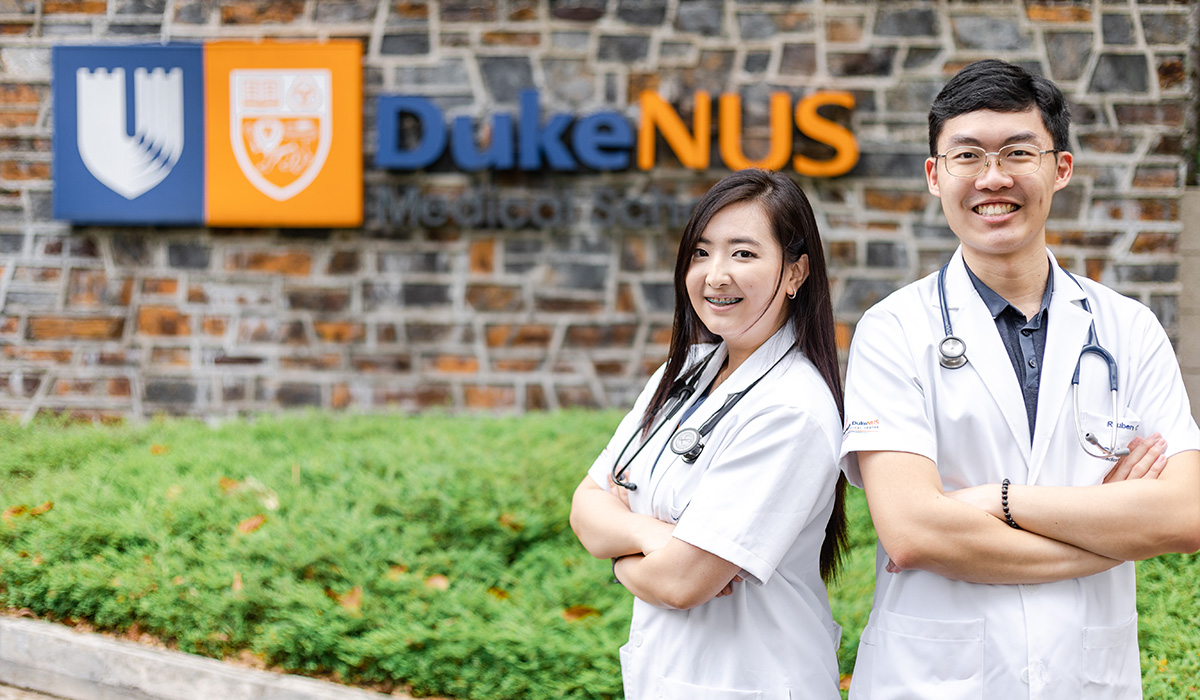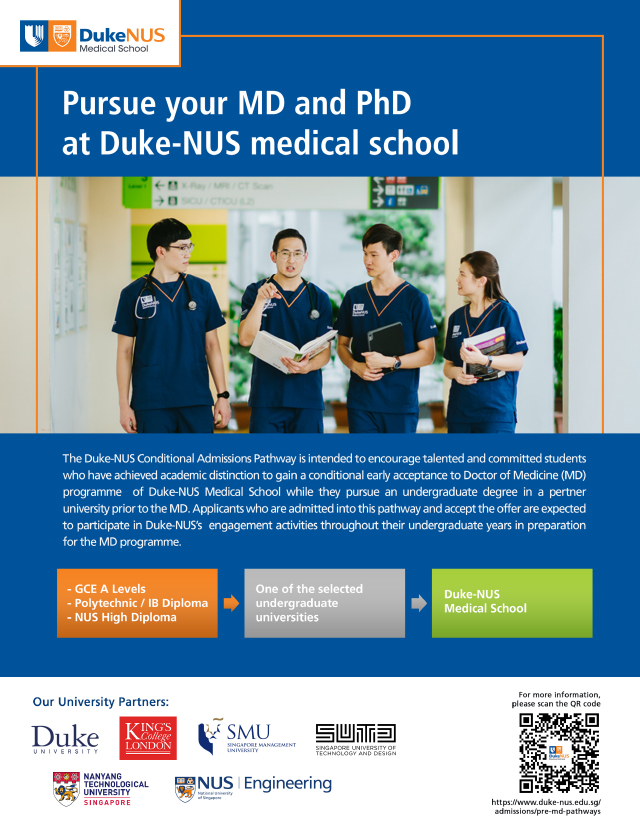Left: Mandi See Suet Ning is currently studying at Duke-NUS Medical School. She holds a Bachelor of Science (Honours) degree in Biomedical Sciences from NUS with a major in Life Sciences.
Right: Chua Kai En, Reuben is currently studying at the Duke-NUS Medical School under the Ngee Ann Kongsi Distinguished Scholars Programme. He holds both a Bachelor of Engineering in Biomedical Engineering and a second major in Innovation and Design.
As the only local graduate-entry medical school in Singapore, the Duke-NUS Medical School aims to advance medical research and innovation with a curriculum that’s formulated to develop creative thinkers who push the boundaries of medicine and enhance medical research, education, and patient care. Two shining examples of such thinkers are Mandi See Suet Ning and Chua Kai En, Reuben.
Both are currently studying at the Duke-NUS Medical School as Doctor of Medicine (MD) candidates, and they seek to expand the frontiers of their research to foster positive change in the health and lives of patients.
Mandi holds a Bachelor of Science (Honours) degree in Biomedical Science from NUS, majoring in Life Sciences. She was accepted directly into the MD programme.
Reuben possesses a Bachelor of Engineering degree in Biomedical Engineering and a second major in Innovation and Design.
He enrolled in the NUS Engineering and Medicine Track, the conditional pathway from NUS Engineering to Duke-NUS.
This Track prepares students in engineering for leadership roles in healthcare, training them as clinicians capable of applying technological advancements for impactful innovation. Students experience an interdisciplinary learning environment, and they apply their engineering skills to identify healthcare issues and develop solutions to them.
We speak to them to find out more about how their pathways have enabled them to pursue their interests and goals.

Mandi See Suet Ning
What inspired you to embark on a career in medicine? What aspects of this field are you especially passionate about?
Mandi: I have always been interested in medicine, and I worked towards this goal after graduating from NUS. Since I started my clinical year at the Duke-NUS Medical School, I have been exposed to various clerkship rotations – neurology, psychiatry, surgery, paediatrics and more. They were all eye-opening experiences.
While still in the midst of uncovering my specific interests, I’ve always been fascinated with the brain, hence the research labs I chose for my internship and final-year project were neurology-related. I also enjoy talking to patients and making them feel comfortable, as well as performing hands-on procedures. I like that in one small way or another, I am able to help.
Reuben: While I have always wanted to pursue medicine due to my interest in the biomedical sciences and to help and empower others, I also wanted to get hands-on and be actively involved in design and invention. Therefore, I chose to embark on a pathway comprising both engineering and medicine so I could get the best of both worlds. Pursuing just one or the other would not have sufficed.
While it is too early in my medical journey to aim for a specific speciality, I would say my biggest inspiration would be the various people I’ve met and our conversations and experiences. Everyone I have crossed paths with has shaped me in one way or another, and I hope to pay that forward by initiating change in the realm of healthcare as a clinician-innovator.

Chua Kai En, Reuben
Tell us about your education experience with Duke-NUS.
Mandi: The school has supported my studies with the Duke-NUS Bursary and I feel that they were really kind to help students out with the Covid-19 Relief Scheme as well.
In our third year of medical school, Duke-NUS set aside about eight months of research time for the MD Programme Research experience, which is where I’m at now. My mentor and co-mentors have been amazing. I reached out to my professor after reading about her projects and having heard from seniors about how great a mentor she is. She truly cares about her mentees’ holistic growth. We are always meeting doctors and professors with a strong inclination for research, and they do welcome us to contact them.
Also, I appreciate the school’s nice and homely atmosphere, with college rooms to study, work, hang out or rest in, as well as its proximity to other important healthcare institutions like Singapore General Hospital, Academia and Outram Polyclinic.
Reuben: While Duke-NUS offers a range of different scholarships, the Ngee Ann Kongsi Distinguished Scholars Programme, which I am studying, is a donated scholarship that is merit-based, tenable for the four-year duration of the MD programme and may be used for tuition fees, living expenses as well as other related miscellaneous fees.
As it covered a substantial proportion of the school fees, receiving this scholarship lifted a huge weight off my parents’ shoulders. If not for this scholarship, I would have to rely on my father to pay off my Tuition Fee Loan debt. Hence, it has helped to relieve this financial burden and allowed me to pursue my ambitions with peace of mind.
Do you have any advice for aspiring medicine students?
Mandi: Don’t be afraid of failure. Though bruising for the ego, it is a steppingstone to help you become better. True strength lies in how you pick yourself up after falling. Also, do not neglect the people who love you and genuinely want what is best for you. I truly appreciate such blessings in life – especially in the form of my father and mother.
Reuben: To my fellow students, as you are essentially pursuing two different degrees, there will be highly stressful moments balancing your studies and personal life. Nevertheless, be patient and give yourself the time and space to embrace and tackle the challenges ahead while also keeping faith in yourself. More importantly, remember why you embarked on this journey and keep that fire close to your heart. The beauty of interdisciplinary education is that no graduate is the same. Everyone has a unique set of strengths to which they can contribute; never let anyone or anything take that away from you.



